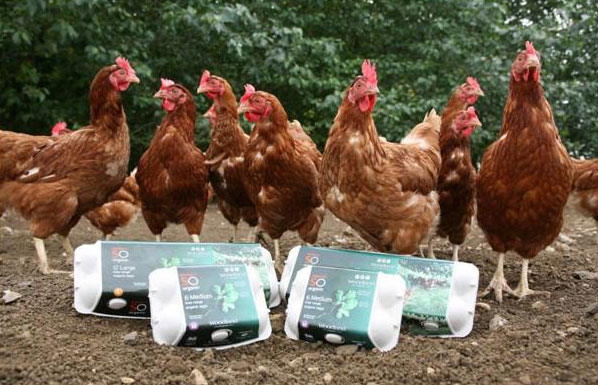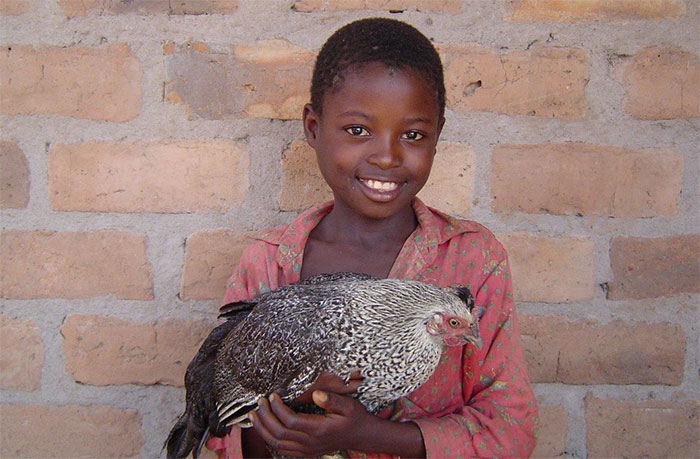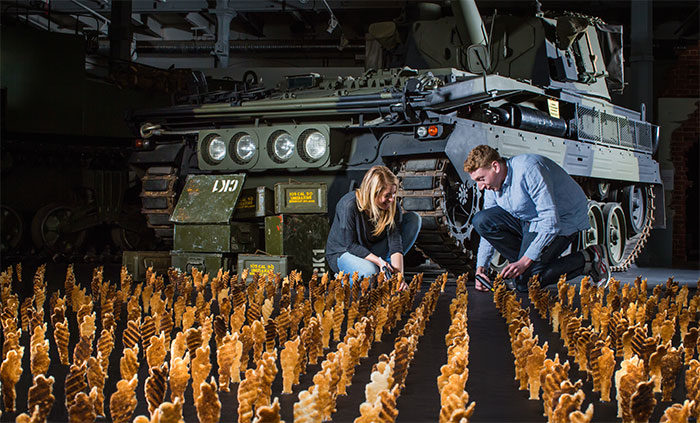
There’s no punch line... Zoe Kay finds out why the relationship between egg producers and charities has been so successful. The concept of charity eggs has been around for a while but the number of brands involved has increased significantly over the last few years. Some producers make a pence per dozen or pack donation to a specific charity. Other companies have created a charity egg brand to distinguish the product and raise funds.
These brands are often supported by specific websites, which raises awareness of both the company’s ethos and the charity’s work. All of the charity eggs are free-range and some are organic, also giving producers a platform to promote welfare and sustainability benefits of buying their eggs.
How did it start?
In 2004 Sainsbury’s started selling Woodland free-range eggs, which include a one pence per dozen donation to the Woodland Trust. The selling point is two-fold; customers were buying eggs from hens that have been reared on ranges with 20 percent tree cover. And at the same time were contributing to the Trusts work, of increasing native woodland in the UK.

Over the last 10 years woodland products sold in Sainsbury’s have raised three and a half million pounds, allowing the Woodland Trust to plant two million trees. To mark the anniversary of this partnership they have announced a one million pound investment to support the First World War Centenary Woods project. It will see four woods created in England, Northern Ireland, Scotland and Wales to remember the fallen.
This partnership is not only about raising money; its aim is also to raise awareness of the benefits of trees on farms. Planting trees on farms is a great way to improve animal welfare and at the same time provide a habitat for wildlife. There are also benefits in terms of, improving water quality, capturing ammonia emissions and protecting top soil; to name a few.
Send a chicken

When Dan and Briony, from Blackacre farm first met Send a Cow at the Royal Bath and West show, they knew it was a charity they wanted to support. As well as both having roots in the South West both Blackacre and the charity, share a common interest in family farming. Blackacre have been producing eggs for over 30 years and Send a Cow support small-holder farmers in Africa – through training, livestock, seeds and on-going support.
A revamped 10-pack of free range eggs was been created, with two pence from each going to Send a Cow. “We have raised enough to provide 658 chickens since last October,” Briony Wood from Blackacre proudly stated. The chickens will be given to poor farming families, along with practical support; each providing 200 eggs a year to eat and sell. Briony, along with the Managing Director Dan Wood will visit Africa, later this year to see the project in action and offer expert advice and mentoring on poultry farming.
Although there are obvious benefits in terms of brand image the company’s main aim was to give something back. Something they have continued with their support of the Break…Fast appeal, which highlights the importance of giving children a good start to the day. With the obvious alignment to the ‘Go to work on an egg’ message, on-pack labelling will encourage customers to donate the gift of a chicken for seven pounds, via text message.
Good eggs
Eggs for soldiers, is a good pun for a great cause. When Noble foods partnered with Help for Heros, they produced a stand out brand that is sold in many national supermarkets. For each box of six eggs sold 15 pence is donated to the charity, which supports members of the armed forces who have been injured whilst serving their country. The success of this brand has raised nearly one million pounds for the charity.
This March Fourth they decided to create a 1,000 strong ‘Toast-A-Cutter Army’ of 12 centimetre high toast soldiers, at the Royal Artillery Museum. Brand Manager Caroline Beatty said, “our ‘Toast-A-Cutter’ Army brings to life the very essence of Eggs For Soldiers in a lighthearted way but it has a serious message at its heart”. “By making one small change to their weekly shop people can make a big difference to our brave service men and women.”
Their partnership with One Difference, earned them a Compassion in World Farming award in 2012, for its One Good Egg brand. One hundred percent of the profit from selling these eggs goes to fund community-farming projects in Africa. They are sold in selected supermarkets and online at Ocado. The charity asks customers to, remember that whilst, “six of One eggs will fund a hen project in Africa. Half a dozen of the other may not.”
Flying high
Air ambulances are popular charities for egg producers to support; both Yorkshire Farmhouse eggs and Fairburn’s Lincolnshire free-range eggs are involved in their own regions.
Adrian Potter from Yorkshire Farmhouse was pleased to say that the one pence per dozen donation they make to the air ambulance has raised 22 thousand pounds in the first 16 months. “It’s important to us to give something back to the community where we live and work,” he stated. There hasn’t been a huge spike in sales but this is a long-term commitment to the charity, which he hopes will offer PR opportunities for both. As the company have expanded into the South East so have their charitable eggs. Eggs from the region now support both the Kent and Sussex and the London air ambulances. This idea “reinforces regionality,” Adrian explained and has promoted great feedback from customers.
The partnership started by supporting the Yorkshire Air Ambulance that has its airfield only a couple of miles down the road from their farm. This July Yorkshire will welcome the Tour de France, with a stage running past the area where they both operate. This prompted them to produce a limited edition ‘James Potter Tour Pack’ – five pence from which will be donated to the air ambulance. This is guaranteed to raise £2K for the charity as well as being great opportunity to celebrate this once in a lifetime visit by cycling’s premier race.
Abby McClymont from the Yorkshire Air Ambulance, shares the excitement that the tour visit is creating in the area – “We are very pleased to be working with the brilliant team at Yorkshire farmhouse eggs on this project”. “It will provide invaluable publicity, which is very important to us being a charity, on top of that we already gain from our brand being in supermarkets across Yorkshire.” “Charity eggs are our most unusual fund raising concept but one that generates a constant income stream for us, which is important to help us maintain our daily fundraising needs.” Running two helicopters in the region costs nearly 10 thousand pounds per day and they receive no help from the government.
L J Fairburn and Son Limited have raised well over two thousand pounds for the Lincolnshire and Nottinghamshire Air Ambulance; from their one pence a dozen donations. “Air ambulances are important for rural communities and particularly for farmers, for whom accidents can happen a long way from main roads”, informed brand director Sarah-Louise Fairburn. “Most of our customers know someone who has benefited from the charity and are keen to give something back.” Being involved in the charities work has also been great for team building. Staff and family members alike have got involved in events like the Lincoln 10K run, to raise valuable funds for the air ambulance.
Feathering the nest
As well as raising much-needed funds, by partnering with an egg producer, charities raise their profile considerably. They are able to feature their logo and messaging on thousands of egg boxes a year on supermarket shelves. “Campaigns like these engage the public in one element of our charity work but then increase awareness of all that we do,” explained Sarah Jupp from Send a Cow. “This allows charities to speak to the public through a brand they already know and trust.”
There are many charity eggs on the market, with just six examples covered here. Another recent edition to the charitable nest is; Laid with Love from The Lakes free range eggs company, which donate two pence per dozen to Cancer research UK. Other regional brands support their local charities, including cricket and football teams. These are causes well known to their customers and that they believe will encourage brand loyalty.
The egg came first
Other food companies promote their philanthropic activity in advertising and on packs. Innocent, for example donate ten percent of their profits to charity. And Red Lion Foods, a brand that sells a range of household staples, gives all of its post-tax profits to armed forces charities. In a similar manner to the egg producers, Hovis partnered with the Royal British in 2011, donating four pence from its poppy branded loaves.
Following the success of Eggs for Soldiers, money is also donated to Help for Heros from sales of milk, cheese, sausages and even whiskey. Similarly there is One brand: bottled water, drinks, toiler roll and foil. These products raise awareness of water, sanitation and fuel projects the charity supports; as well as raising funds. Send a Cow is also working with Cricketer farm, who donate 5p per pack of Cheeky Cow cheese sold. Woodland chicken and turkey have been added to the Sainsbury’s range, donating two and five pence per bird. Eggs however, remain the most common charitable food product.
So why eggs?
The companies selling eggs are the producers themselves, not big food groups who sell lots of different products. They keep the chickens themselves, are close to the egg brand and therefore can be close to the charities they work with. You trust that they were well chosen and the money will be well spent. Personal interest and motivation, is required to make these partnerships work and enthusiasm of the teams involved is evident.
Sarah Jupp suggested, “people buy eggs each week and can make a difference just by changing which they purchase - they don’t need to make any additional donations”. The hope then is they will support the charity in other ways, whilst remaining loyal to the egg brand. “Eggs are a daily commodity – so ideas like this will help them choose the brand,” Abby McClymont re-iterated. Charity eggs are providing a point of difference, with a benevolent reason. So, when customers are doing their weekly shop, they are being asked to consider, not only how the eggs are produced, but also whom they are helping.
